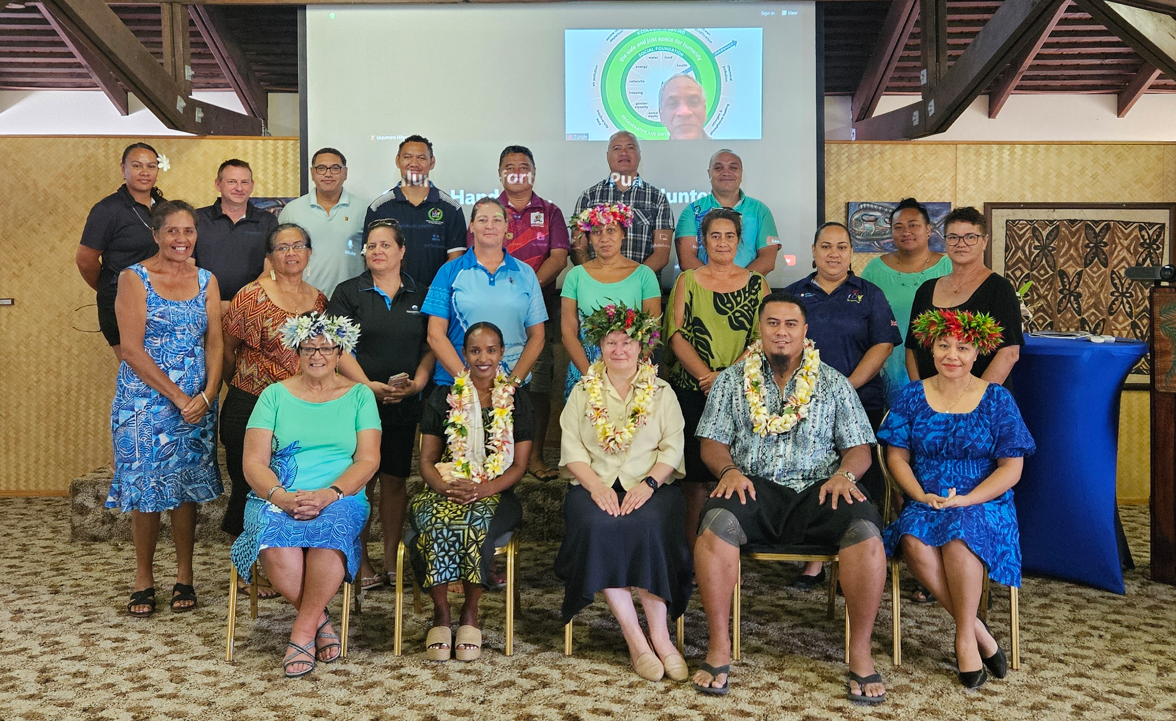Cook Islands aims to bridge digital divide with new national strategy
Tuesday 13 February 2024 | Written by Losirene Lacanivalu | Published in National, Technology

Office of the Prime Minister ICT and UNDP team at the launch. SUPPLIED/ 24020913
Cook Islands’ first Digital Transformation Strategy was launched last week by the government and the United Nations Development Programme (UNDP) team.
The National Digital Strategy 2024-2030 was launched by Minister Tingika Elikana, at the fourth workshop of the digital transformation stakeholder group.
The newly appointed UNDP Resident Representative, Aliona Niculita, who is based in the UNDP multi-country office for the Cook Islands, Niue, Samoa and Tokelau, in Samoa was also present.
The Digital Strategy 2024-2030 incorporates the activities of the Digital Transformation Project and the eCommerce Accelerated Work plan, both under the inclusive umbrella of Cook Islands National ICT Policy 2023-2027.
The policy is expected to provide a framework supporting and extending the benefits of digital opportunities for all, thus aiming to facilitate socio-economic development and enabling greater participation in the local and global economy.
The objective of the policy is to ensure that all citizens are able to engage effectively in the information society with no digital divide, expand ICT skills and education, and promote expansion of qualified ICT skill-base in the Cook Islands.
It also aims to promote effective government ICT operational management. According to the policy document, the government’s IT network serves approximately 2500 users, most government offices.
Elikana acknowledged the Samoan UNDP office staff for their support, provided through the ICT unit of the Cook Islands Prime Minister’s Office, in using digitalisation to achieve the Sustainable Development Goals in the country.
He mentioned the government’s continued commitment towards digital development during the Pacific Islands Forum Leaders Meeting where the leaders endorsed the Lagatoi Declaration on Digital Transformation and its linkages to their own 2050 Strategy Implementation Plan.
Elikana also acknowledged UNDP support of important personnel for the project, namely the local national coordinator, Maureen Hilyard, who was based at the ICT Unit, and expert UNDP strategist, Calum Handforth, based in Singapore. Handforth coordinated much of the information for the Strategy which was gathered from local stakeholder surveys and discussions that were part of regular project activities.
UNDP Resident Representative Niculita acknowledged that she was able to visit the Cook Islands, to meet and discuss UNDP funded projects with government officials as well as project team leads who are coordinating project activities on the ground.
She said she was pleased that the National Digital Strategy project had achieved a successful conclusion and that she was able to be present at its official launch. Niculita also appreciated the support that had been given to the project by the UNDP staff from Samoa.
UNDP strategist Handforth initiated discussions about digital transformation with the multi-stakeholder group which he had to present virtually from Singapore due to an unexpected flight cancellation.
In August however, he was on-island, in person, to coordinate a session with the main stakeholder group as well as a high-level discussion with government and financial leaders about the potential of moving towards more digital processes.
At this closing session for the project, Handforth again participated virtually to encourage the government to support the rich talent of creatives and entrepreneurs who exist within the Cook Islands.
He added that the government should continue SMART funding that would support digital initiatives to enhance and benefit our economy. The SMART economy initiative was developed in 2020 by the Government, through the Ministry of Finance and Economic Management, to support businesses to move into the digital economy by encouraging the use of technology to increase productivity and efficiency. This support came in the form of grant funding of a minimum of $25,000 and a maximum of $100,000 or tax credits.














































